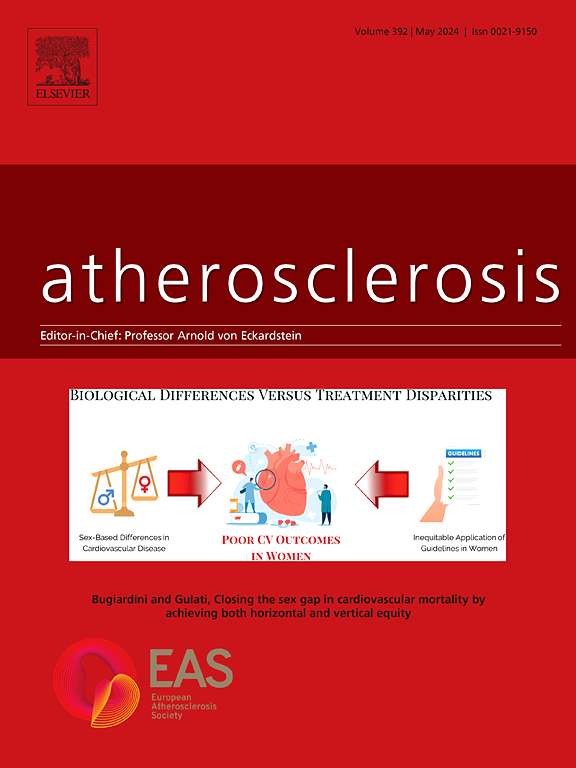Clinical familial hypercholesterolemia, heart healthy dietary adherence, and cardiovascular risk
IF 5.7
2区 医学
Q1 CARDIAC & CARDIOVASCULAR SYSTEMS
引用次数: 0
Abstract
Background and aims
Individuals with familial hypercholesterolemia (FH) are at high risk of premature cardiovascular disease. A healthy lifestyle and lipid-lowering medication are essential to reduce this risk. We examined if adherence to a heart healthy diet provides additional risk reduction independent of lipid-lowering medication.
Methods
The Dutch Lipid Clinic Network (DLCN) criteria was used to diagnose FH (n=559 individuals with probable or definite FH) in the Copenhagen General Population Study(n=106,899) and the Copenhagen City Heart Study(n=7,451). Individuals were categorised by their level of heart healthy dietary adherence to Danish dietary guidelines, corresponding to international guidelines. Concentrations of low-density lipoprotein (LDL) cholesterol, apolipoprotein B (apoB), non-high-density lipoprotein (HDL) cholesterol, remnant cholesterol, triglycerides, and lipoprotein(a) (Lp(a)), and risk of ischaemic heart disease (IHD) were assessed by clinical FH category and level of dietary adherence.
Results
Women had a higher heart healthy dietary adherence compared to men. Mean concentrations of LDL cholesterol, apoB, non-HDL cholesterol, remnant cholesterol, and triglycerides increased stepwise by lower dietary adherence category, regardless of clinical FH category. Lp(a) concentration did not change by adherence to dietary guidelines. Results were similar in individuals taking lipid-lowering medication. Risk of ischemic heart disease (IHD) was lower in individuals with a higher dietary adherence (ranging from 8 to 57 % lower risk) compared to individuals with a very low dietary adherence regardless of clinical FH category.
Conclusions
Adherence to a heart healthy diet is associated with lower concentrations of atherogenic lipids and lipoproteins, and lower risk of IHD in individuals with clinical FH, independent of treatment with lipid-lowering medication. Dietary adherence should be emphasised as an important tool in addition to treatment with lipid-lowering medication in individuals with FH.

临床家族性高胆固醇血症、心脏健康饮食依从性和心血管风险。
背景和目的:家族性高胆固醇血症(FH)患者是早发心血管疾病的高危人群。健康的生活方式和降脂药物对降低这种风险至关重要。我们研究了坚持心脏健康饮食是否能提供独立于降脂药物的额外风险降低。方法:在哥本哈根普通人群研究(n= 106899)和哥本哈根城市心脏研究(n= 7451)中,采用荷兰脂质临床网络(DLCN)标准诊断FH (n=559例疑似或确诊FH)。根据心脏健康饮食对丹麦饮食指南的遵守程度对个人进行分类,与国际指南相对应。低密度脂蛋白(LDL)胆固醇、载脂蛋白B (apoB)、非高密度脂蛋白(HDL)胆固醇、残余胆固醇、甘油三酯和脂蛋白(Lp(a))的浓度以及缺血性心脏病(IHD)的风险通过临床FH分类和饮食依从性水平进行评估。结果:与男性相比,女性有更高的心脏健康饮食依从性。低密度脂蛋白胆固醇、载脂蛋白胆固醇、非高密度脂蛋白胆固醇、残余胆固醇和甘油三酯的平均浓度随着饮食坚持程度的降低而逐渐增加,与临床FH类别无关。Lp(a)浓度未因遵循膳食指南而改变。服用降脂药物的个体结果相似。与饮食依从性非常低的个体相比,无论临床FH类别如何,饮食依从性较高的个体(风险降低8%至57%)患缺血性心脏病(IHD)的风险较低。结论:坚持心脏健康饮食可降低致动脉粥样硬化性脂质和脂蛋白浓度,降低临床FH患者发生IHD的风险,而无需接受降脂药物治疗。除了使用降脂药物治疗外,应强调饮食依从性是FH患者的重要工具。
本文章由计算机程序翻译,如有差异,请以英文原文为准。
求助全文
约1分钟内获得全文
求助全文
来源期刊

Atherosclerosis
医学-外周血管病
CiteScore
9.80
自引率
3.80%
发文量
1269
审稿时长
36 days
期刊介绍:
Atherosclerosis has an open access mirror journal Atherosclerosis: X, sharing the same aims and scope, editorial team, submission system and rigorous peer review.
Atherosclerosis brings together, from all sources, papers concerned with investigation on atherosclerosis, its risk factors and clinical manifestations. Atherosclerosis covers basic and translational, clinical and population research approaches to arterial and vascular biology and disease, as well as their risk factors including: disturbances of lipid and lipoprotein metabolism, diabetes and hypertension, thrombosis, and inflammation. The Editors are interested in original or review papers dealing with the pathogenesis, environmental, genetic and epigenetic basis, diagnosis or treatment of atherosclerosis and related diseases as well as their risk factors.
 求助内容:
求助内容: 应助结果提醒方式:
应助结果提醒方式:


